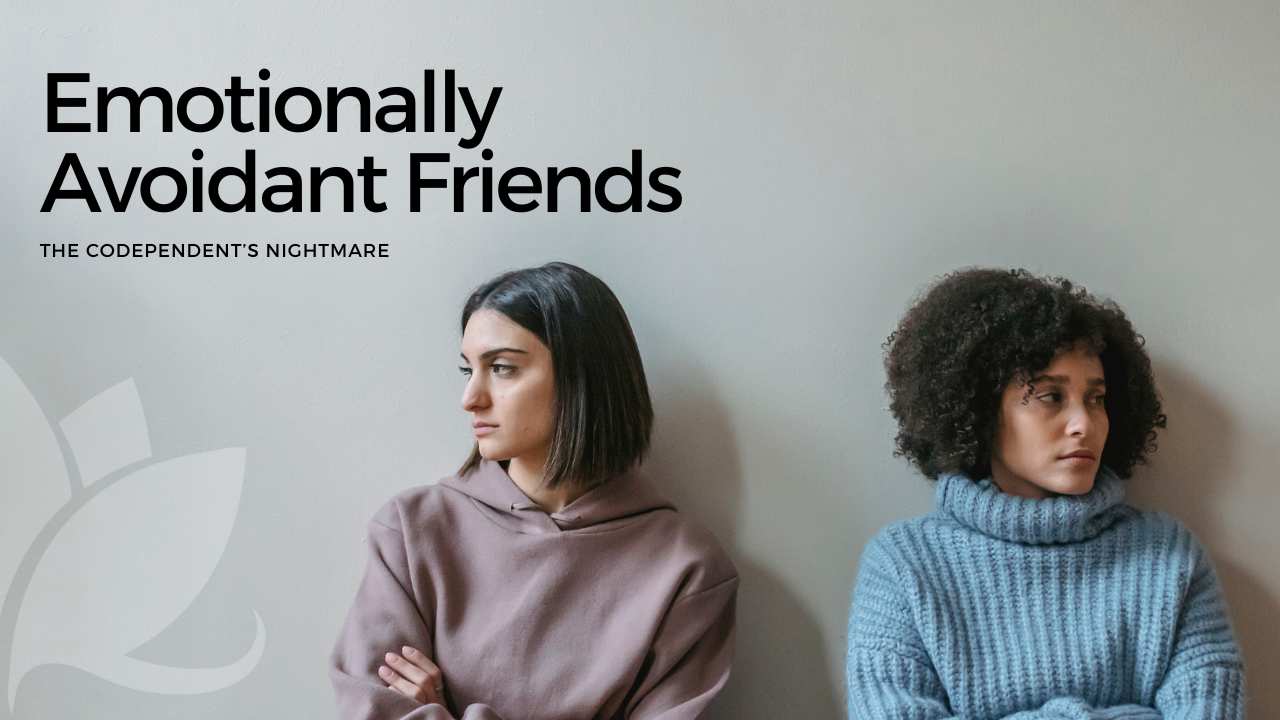Nurturing Connections: Understanding Codependency and Emotionally Avoidant Friends
by Lisa A. Romano

Hey there, fellow seekers of self-healing and personal growth!
Today, want to dive into a topic that hits close to home for many of us – codependency and the pain of attracting emotionally avoidant friends. As someone who has walked this path, I understand the frustration and longing that comes from not feeling deeply seen and understood by those we care about.
Let's explore this journey together and discover ways to navigate these relationships without sacrificing our own well.
Let's also acknowledge that humans need to feel seen and heard and that these needs lie deep within us. We all desire connections that go beyond surface-level interactions. We yearn for relationships where we can be authentic, sharing our hopes and vulnerabilities without fear of judgment or rejection. It can be incredibly triggering and painful when we find ourselves repeatedly attracting emotionally avoidant friends.
At the root of codependency lies childhood emotional neglect; needs for emotional connection and validation were not adequately met. This neglect can lead us to seek love from external sources, often becoming people-pleasers and losing sight of our own autonomy and self-worth.
But it is crucial to understand that the emotionally avoidant behavior of our friends is not a reflection of our worth or desirability as individuals. Their avoidance stems from their own unresolved emotional wounds and coping mechanisms.
It's not personal, even though it may feel that way.
To navigate these relationships and protect our own well-being, here are some easy-to-follow steps:
1. Cultivate self-awareness by recognizing your relationship patterns and tendencies: Understand why you may attract emotionally avoidant friends and how it connects to your own experiences of childhood emotional neglect and codependency traits. Were your parents emotionally distant? Were love, affection, and attention withheld from you as a child? Do you tend to give more to people in an effort for them to love or need you in return? Do you tend to be obsessive about love and relationships?
Getting honest about how you show up in relationships will lead to incredible personal insights you can use to help you unlock the keys to codependency in your life.
2. Practice self-compassion: Be gentle with yourself as you navigate these challenging dynamics. Remember that healing is a process and a journey that takes time. Treat yourself to the kindness and understanding you would offer a dear friend as you become aware of how you show up in relationships. Remember that codependency, love addiction, and seeking approval are manifestations of deep wounds. It could be no other way, Dear One. This is not your fault. You are breaking cycles, developing self-awareness, and learning to live above the veil of consciousness.
This is an exciting yet confusing time, so be gentle with yourself.
3. Set healthy boundaries: Establish clear boundaries within your relationships. Communicate how you would like the friendship to unfold and be realistic about your expectations. Understand that it is okay to prioritize your well-being and protect yourself from emotional harm. But remember, you are in control. If you are being drained by offering too much, it's okay to pull back out of love and reevaluate how much effort you extend to a friendship that returns little.
Remember that emotionally avoidant people may not be aware they are avoidant, hard to read, or that their inability to reach out and make you a priority is harmful. They are simply behaving in a way that makes them feel safe, so rather than react from the wounded ego, try accepting them as they are. Move along if needed, make new friends, try new things, and remain committed to moving forward.
4. Seek support: Surround yourself with a supportive network of individuals who validate your experiences or join support groups where you can explore your codependency tendencies and learn from others who are as committed to you to self-discovery, self-healing and breaking free of codependency as well as conquering unrealistic expectations.
It can be difficult to accept the limits of an emotionally avoidant friend, and a community of others who understand your challenges can be incredibly useful.
5: Hold onto yourself: Redirect your energy towards your own and self-healing. Explore activities and hobbies that bring you joy and fulfillment. Invest in your own development and work towards building a strong sense of self. Branch out and be open to cultivating relationships with new and different friends.
Codependency can cause you to rely and depend way too much on a friend. When that friend is emotionally avoidant, this can trigger feelings of low self-worth, sadness, and abandonment. Remember, you are doing sacred work as you learn to live above the veil of consciousness rather than acting out unhealed childhood patterns.
A codependent person can be highly drawn to an avoidant, counter-dependent person. This means that it is not our friend's fault if we seek a particular outcome they may not be able to or comfortable offering. We are in control, and the more above the veil we are, objectively observing our patterns and traits, the better we can navigate our relationships with others despite their idiosyncrasies.
Below the veil of consciousness, we manifest friendships and relationships that mirror our unhealed trauma. It is not uncommon for a codependent to attract an avoidant counter-dependent friend or partner into their lives.
We have the power to break free from the grip of codependency and attract healthier, more fulfilling relationships. By understanding that the emotionally avoidant behavior of your friends is not a reflection of your worth, you can navigate these relationships without sabotaging them completely.
Embrace your journey of self-autonomy and self-healing. Prioritize and nurture the beautiful connections that come into your life. You are deserving of love, understanding, and authentic relationships – both with others and yourself.
With love and unwavering belief in your strength,
Lisa A. Romano






